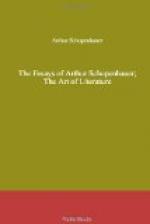In order to present the contents of this book in a convenient form, I have not scrupled to make an arrangement with the chapters somewhat different from that which exists in the original; so that two or more subjects which are there dealt with successively in one and the same chapter, here stand by themselves. In consequence of this, some of the titles of the sections are not to be found in the original. I may state, however, that the essays on Authorship and Style and the latter part of that on Criticism are taken direct from the chapter headed Ueber Schriftstellerei und Stil; and that the remainder of the essay on Criticism, with that of Reputation, is supplied by the remarks Ueber Urtheil, Kritik, Beifall und Ruhm. The essays on The Study of Latin, on Men of Learning, and on Some Forms of Literature, are taken chiefly from the four sections Ueber Gelehrsamkeit und Gelehrte, Ueber Sprache und Worte, Ueber Lesen und Buecher: Anhang, and Zur Metaphysik des Schoenen. The essay on Thinking for Oneself is a rendering of certain remarks under the heading Selbstdenken. Genius was a favorite subject of speculation with Schopenhauer, and he often touches upon it in the course of his works; always, however, to put forth the same theory in regard to it as may be found in the concluding section of this volume. Though the essay has little or nothing to do with literary method, the subject of which it treats is the most needful element of success in literature; and I have introduced it on that ground. It forms part of a chapter in the Parerga entitled Den Intellekt ueberhaupt und in jeder Beziehung betreffende Gedanken: Anhang verwandter Stellen.
It has also been part of my duty to invent a title for this volume; and I am well aware that objection may be made to the one I have chosen, on the ground that in common language it is unusual to speak of literature as an art, and that to do so is unduly to narrow its meaning and to leave out of sight its main function as the record of thought. But there is no reason why the word Literature should not be employed in that double sense which is allowed to attach to Painting, Music, Sculpture, as signifying either the objective outcome of a certain mental activity, seeking to express itself in outward form; or else the particular kind of mental activity in question, and the methods it follows. And we do, in fact, use it in this latter sense, when we say of a writer that he pursues literature as a calling. If, then, literature can be taken to mean a process as well as a result of mental activity, there can be no error in speaking of it as Art. I use that term in its broad sense, as meaning skill in the display of thought; or, more fully, a right use of the rules of applying to the practical exhibition of thought, with whatever material it may deal. In connection with literature, this is a sense and an application of the term which have been sufficiently established by the example of the great writers of antiquity.




